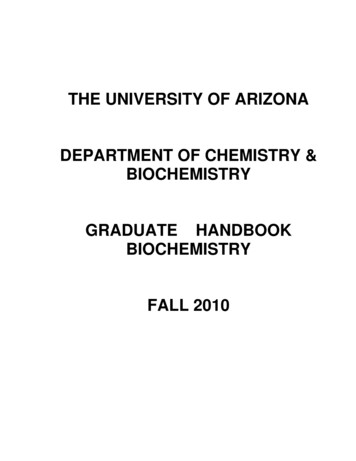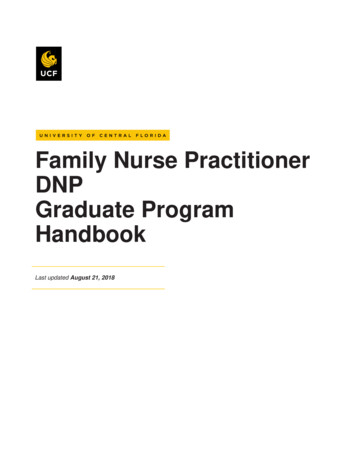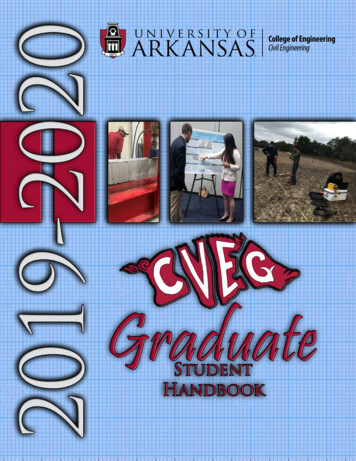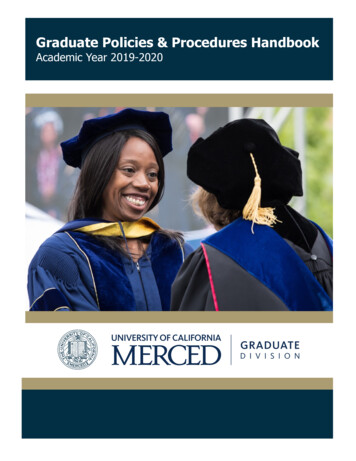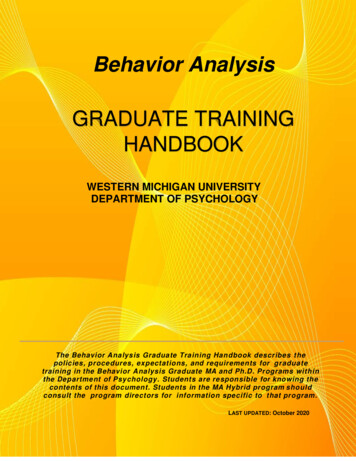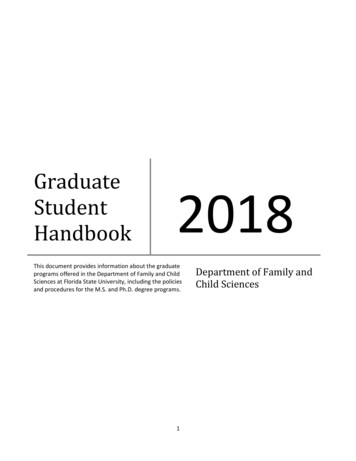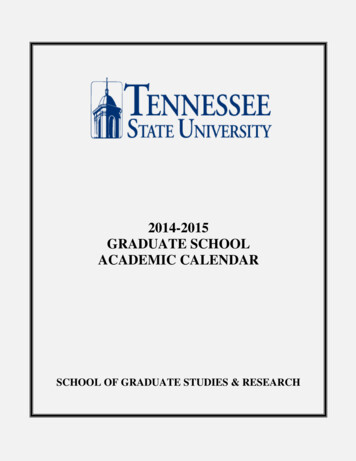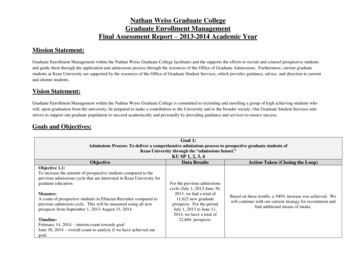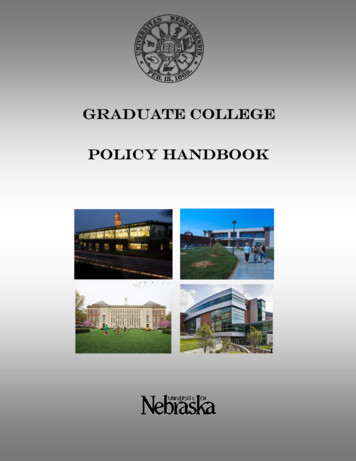
Transcription
Graduate collegepolicy handbook
The Graduate College Governance Documents and Related Policy Documentswere edited and approved by the 2011-12 members of the Executive GraduateCouncil.Linda Pratt - NU Graduate Dean & Chair of CommitteeValerie Cisler - Elected Representative, UNKDavid Crouse - Graduate Dean, UNMCPat Dussault Graduate Dean, UNLLibby Jones Elected Representative, UNLShantaram Joshi - Appointed Representative, UNMCMichael O’Hara Elected Representative, UNODavid Shaw - Appointed Representative, UNMCJulie Shaffer Elected Representative, UNKDeborah Smith-Howell - Graduate Dean, UNOKenya Taylor Graduate Dean, UNKEthel Williams - Elected Representative, UNOKathryn Zuckweiler - Alternate Representative, UNKHandbook Layout by Shannon Malousek1
University of NebraskaGraduate College Policy HandbookTable of ContentsUniversity Graduate College Governance DocumentsI.II.General Organization of the Graduate College .4The Graduate Faculty .4A.B.C.D.E.F.G.Authority and Responsibility . 4Membership . 5Criteria for Membership . 5Procedures for Appointment . 5Procedure of Appeal . 7Graduate Supervisory Committees . 8Meetings. 8III. The Executive Graduate Council .9A.B.C.D.Authority and Responsibility . 9Membership . 9Terms . 10Meetings. 10IV. Amendments and Conflicts .10V. Dean of the Graduate College .11VI. Administration of the Graduate College .12A.B.C.D.E.F.G.Office of the Dean of the Graduate College . 12Responsibilities of the Executive Graduate Council. 12Procedures for Meeting of the Faculty of the Graduate College . 13Procedures for Bringing Forward Motions on the Floor of the Executive GraduateCouncil Without Prior Review . 13Procedures for Voting . 14Graduate Application Fee . 15Organizational Chart of the Graduate College . 16VII. Campus Graduate College Governance Documents .17UNIVERSITY OF NEBRASKA AT KEARNEY . 17UNIVERSITY OF NEBRASKA-LINCOLN . 21UNIVERSITY OF NEBRASKA MEDICAL CENTER . 25UNIVERSITY OF NEBRASKA AT OMAHA . 282
Related Policy DocumentsI.Graduate Degrees/Certificates.32A.B.Recommendation on the Requirements for Degrees . 32Expedited Review of Proposed New Graduate Certificate Programs . 33II.Policy on the Pursuit of Graduate Degrees at the University of Nebraska byPersons Holding the Rank of Assistant Professor or Above (or Equivalent) .34III. Graduate Students .35A.B.C.D.E.F.G.H.Veterans Administration – Certification of Graduate Students . 35Seniors Approval for Graduate Courses . 35Simultaneous Matriculation . 35Students Admitted to Professional Colleges . 35Supervisory Committee . 36Procedure for a Graduate Student to Receive a Degree from a Campus Other than thatwhere the Degree is Based . 36Policy on Summer Tuition Remission for Graduate Assistants . 38Retention of Materials used in the Academic Evaluation of Students . 38IV. Rules for Non-Traditional Workshops, Short-Term Courses and Special SeminarsOffering Graduate Credit .39A.B.C.D.V.Background . 39Policy Statement . 39Rules for all Non-Traditional Courses Offered for Graduate Credit by an Unit of theUniversity of Nebraska . 39Off-Campus Graduate Course Offerings . 40Non-Graduate Faculty Rules for Teaching Graduate Courses .41A.B.Requirements of Non-Graduate Faculty to Teach Graduate Courses . 41Staff Member Graduate Credit. 41VI. Guidelines for Graduate Programs .41A.B.C.D.E.F.VII.Guidelines for Submission and Process of Evaluation of New or Modified GraduatePrograms . 41EGC Review Cycle for Proposed New Graduate Programs . 43Addendum – Details of Program Proposal Format . 44Process for Monitoring Graduate Program Reviews . 47Procedure for the Deletion or Consolidation of Graduate Programs . 48Guidelines for the Deletion or Consolidation of Graduate Programs . 49General Appeal Procedures for Academic Matters Concerning GraduateStudents.51A.B.Appeal of General Academic Matters Related to Student Programs . 51Appeal of Grades in Graduate-Level Courses . 53AppendicesAppendix 1:Appendix 2:Appendix 3:Appendix 4:Graduate Faculty Application . 54Legal Opinion, Richard Wood . 58Sample Degree . 59Expedited Review Form . 603
Graduate College Governance DocumentsI.General Organization of the Graduate CollegeA. There shall be a single University-wide Graduate College with a single University-wide graduatefaculty, having the authority and responsibilities designated in Section II, THE GRADUATEFACULTY.B. Unless superseded by direct action of the Graduate Faculty acting as a whole, the legislative andacademic authority of the Graduate Faculty shall be vested in an Executive Graduate Council.The authority and responsibilities of the Council are designated in Section III, THEEXECUTIVE GRADUATE COUNCIL.C. The Dean of the Graduate College shall be the University-wide executive officer for graduatestudies and research. The Dean shall coordinate graduate programs among the respective campusunits. The Dean, or the Dean s designee, shall serve as the presiding officer of the Universitywide Graduate Faculty and Councils thereof. The Dean shall recommend appointment to orremoval from the Graduate Faculty and shall be administratively responsible for the welfare ofthe Graduate College and for implementing the policies of the Board of Regents and theGraduate Faculty concerning graduate studies and research. The office of the Dean of theGraduate College shall be the clerical center and clearing house for all official communicationsbetween the Executive Graduate Council, and the faculty, administrators, and external agencies.D. Campus Deans for Graduate Studies shall be administratively responsible to their respectiveChancellors, and to the Dean of the Graduate College in their capacities as officers of theCollege. Campus Deans shall act as liaison officers between the Chancellors and the Dean of theGraduate College, preside over the meetings of their campus Graduate Councils and campusGraduate Faculties, and administer their respective campus graduate programs.E. Under authority delegated to them by the Executive Graduate Council, the Graduate Faculty ofeach campus shall conduct the affairs of the Graduate College which are specific to their campus,including the election of a campus Graduate Council to act on behalf of the campus GraduateFaculty. Actions of a campus Graduate Faculty or a campus Graduate Council shall notsupersede the authority of the University-wide Graduate Faculty or of the Executive GraduateCouncil.II.The Graduate FacultyA. Authority and Responsibilities1. The authority and responsibilities of the Graduate Faculty shall include adoption ofattendance rules, determination of requirements for graduation in all Graduate Collegeprograms, recommendations of candidates therefore, developing research and extensionprograms, discipline of students for conduct solely affecting the College, and providing to theBoard of Regents recommended admission requirements, courses of study and other relevantmaterial for meeting statutory requirements.4
B. Membership1. Graduate Faculty. The Graduate Faculty may vote on any matter presented to the GraduateFaculty, including the election of the Graduate Council for their specific campus. They mayalso hold any elected office in the Graduate College. Graduate Faculty may teach graduatecourses, serve on final examining committees, and serve on supervisory committees.Graduate Programs may have additional written criteria, approved by the campus Dean forGraduate Studies, for participation on Ph.D. supervisory committees. Graduate Faculty havethe additional responsibility of voting on certain nominations of Graduate Faculty in theirdepartment/school or interdepartmental area program.2. Emeriti Status. Upon the recommendation of the departmental/school or interdepartmentalGraduate Committee retired Graduate Faculty who have been appointed to emeritus statusmay retain the rights and privileges associated with their status as Graduate Faculty. Theserights and privileges include permission to teach graduate courses, to serve as members ofgraduate programs, or to co-chair the supervisory committees of doctoral students with aresident Graduate Faculty member. Emeriti faculty can be reappointed annually by thedepartmental/school Graduate Committee, and approved by the departmental/school Chair orHead and by the respective campus Dean for Graduate Studies, University of Nebraska. Anycompensation continues to reside with the department/school.C.Criteria for Membership1. Graduate Faculty. A faculty member nominated for appointment as Graduate Facultymember must meet the following minimum requirements:a. Hold the rank of Senior Lecturer1, Assistant Professor or above;b. Hold the terminal degree normally accepted for academic employment in the discipline orits clear equivalent as determined by the Graduate Committee of the nominee'sdepartment/school or interdepartmental area;c. Be actively involved in scholarly activity and/or graduate teaching as part of his or herregular duties;d. Have demonstrated clear evidence of continuing scholarly activity at the national leveland potential in the discipline, beyond teaching.D.Procedures for Appointment1. Appointment as Graduate Faculty without ApplicationNew faculty in departments/schools with graduate degrees. All future new University ofNebraska faculty members who meet the required criteria and are to be appointed to specificterm, health professions or continuous appointments in academic departments/schools thathouse a graduate degree granting program (masters, doctoral, or both) would automatically beappointed as Graduate Faculty. No application process would be required. All new faculty inthis category will be appointed as Graduate Faculty in their letter of appointment at the timeof hire, contingent upon the approval of the campus Dean for Graduate Studies.1Senior lecturers who seek Graduate Faculty designation must apply for such appointment.5
2. Faculty Who Must Apply to be Designated Graduate Facultya. Faculty in departments/schools not granting graduate degrees. With the exception offaculty appointed as Graduate Faculty without application under Section D1, all currentor future University of Nebraska faculty members in academic departments/schools thatcurrently do not house a graduate degree granting program (masters, doctoral, or both)must apply to be appointed as Graduate Faculty.b. Future faculty on special appointment (including senior lecturer and adjunctfaculty). All future University of Nebraska faculty members on special appointment inany academic department/school (whether it houses a graduate degree program or not)must apply to be appointed as Graduate Faculty.3. Process for Applying to Become Graduate FacultyEligible faculty members will utilize the following process to apply for status as GraduateFaculty (see Appendix 1):a. Submit an application form and vita to the chair of the graduate committee in the relevantdepartment/school or interdepartmental program.b. All Graduate Faculty in the relevant department/school will vote on the application. Atwo-thirds majority of these graduate faculty must support the nomination in order for itto be forwarded to the campus-level Dean for Graduate Studies. The chair of the graduatecommittee will write a letter interpreting the department/school vote (i.e., explaining thereasons for supporting the nomination), and then forward the file to the campus Dean forGraduate Studies.c. For faculty in departments/schools without graduate programs, or in departments/schoolswith graduate programs with fewer than six Graduate Faculty, or for interdepartmentalprograms, a special ad-hoc six-person review committee of Graduate Faculty will beappointed by the campus Dean for Graduate Studies. The chair of the ad-hoc committeewill write a letter to the campus graduate dean explaining the reasons for supporting thenomination. A two-thirds or greater majority of the committee must support thenomination. In the case of interdepartmental graduate programs, the director of theprogram will recommend members to the campus Dean for Graduate Studies.d. The campus Dean for Graduate Studies will then review the nomination, and eitherapprove or defer it. If approved, the nomination is forwarded to the Dean of the GraduateCollege.e. The Dean of the Graduate College will then review the nomination and either approve ordefer the nomination. If approved, the Dean formally appoints the faculty member toGraduate Faculty status.4. Special ProceduresIn those cases in which there is no graduate program in a particular discipline on a given campus,or in which the number of Graduate Faculty in a particular discipline is less than six, a person inthat discipline on that campus may be nominated for Graduate Faculty by any Graduate Facultymember in that discipline or a related discipline on that campus or another campus. Suchnominations must be recommended by either two-thirds vote of the Graduate Faculty of thecorresponding department/school on another campus, or by two-thirds vote of a special ad hoccommittee of six Graduate Faculty that shall:6
a. include all the Graduate Faculty in the nominee's department/school or interdepartmentalarea, with the remainder being Graduate Faculty from the same campus or similardepartments/schools or interdepartmental areas from the same campus; andb. be appointed by the campus Dean for Graduate Studies from names submitted by thenominator.c. In all cases, nominations for Graduate Faculty shall be submitted from the groupsindicated above to the campus Dean for Graduate Studies for approval. If the campusDean approves a nomination, it shall be submitted to the Dean of the Graduate Collegefor approval.E. Procedure of Appeal1. Any nominee, or nominator only with the written permission of the nominee, who believesthat his or her nomination has not been properly acted upon by the departmental/school orinterdepartmental Graduate Committee, or the chairperson thereof, or departmentalchairperson/school director, or college dean, may appeal to the campus Dean for GraduateStudies, who may wish to refer the appeal to the campus Graduate Council for advice. Anominee, or nominator only with the written permission of the nominee, who believes that hisor her nomination has not been properly acted upon by a campus Dean for Graduate Studiesmay appeal to the Dean. The nominee, or nominator only with the written permission of thenominee, may at his or her discretion discuss the nomination under appeal with either thecampus Dean for Graduate Studies or the Dean. In the event that such a meeting is scheduled,both the nominee and the nominator may attend.2. The Executive Graduate Council shall serve an appellate function when a nominee, ornominator only with the written permission of the nominee, believes that his or hernomination has been improperly deferred by the Dean. If the Executive Graduate Councilupholds the deferment, that decision shall be final. If the Executive Graduate Councilrecommends that the Dean's previous decision to defer be reversed, the nomination shall bereturned to the Dean with a recommendation that it be approved. If the Dean does notapprove it, the nomination and all accompanying documents shall be forwarded to theExecutive Vice President and Provost; if the Executive Vice President/Provost does notapprove it or if the Executive Vice President/Provost and the Dean are one and the same, thenomination and documents shall be forwarded to the President for final disposition. Decisionson appeals forwarded by Council approval must be made within twenty (20) working days.3. The nominee, or nominator only with the written permission of the nominee, must file anyappeal of any deferral of his or her nomination within twenty (20) working days afternotification of such deferral.4. Only data which accompanied the original nomination may be considered at any level of anappeal.5. Even though a particular nomination is under appeal, a new nomination containing additionalinformation may be submitted to the campus Dean at any time without prejudicing the appeal.The appeal will then be held in abeyance during the period that the new nomination is beingconsidered by the campus Dean.7
F. Graduate and Supervisory Committees1. Graduate Committees. Each department/school or interdepartmental area offering majorwork leading to the master or doctoral degree shall have a Graduate Committee consisting ofnot less than three Graduate Faculty, one of whom shall serve as chairperson of theCommittee.All Graduate Committees must have at least a two-thirds majority of Graduate Faculty on theCommittee and its chairperson must be a member of the Graduate Faculty.For graduate programs involving only one department/school, membership on the GraduateCommittee shall be recommended by the Graduate Faculty of the department/school throughits departmental chairperson/school director, for approval and appointment by the campusDean. For graduate programs involving more than one department/school, membership on theGraduate Committee shall be recommended by the participating Graduate Faculty of theparticipating departments/schools through the chairperson of the interdepartmental areacommittee, or, if no such committee exists, through the chairpersons of the participatingdepartments/schools, for approval and appointment by the campus Dean. GraduateCommittees are responsible for the general supervision of graduate work in theirdepartments/schools or interdepartmental areas.2. Supervisory Committees. For each student who has been accepted by a departmental/schoolor interdepartmental area for doctoral studies there shall be a Supervisory Committee, of atleast four members, all of whom shall be Graduate Faculty. Membership on SupervisoryCommittees shall be recommended by the departmental/school or interdepartmental GraduateCommittee for approval and appointment by the campus Dean. Graduate programs may haveadditional written criteria, approved by the campus Dean for Graduate Studies, forparticipation on Ph.D. supervisory committees. The minor, or related fields, if applicable,shall be represented on the Committee. The Committee shall approve the student's program ofstudies, monitor the student's academic progress, approve the dissertation subject, prepare,give, and evaluate the comprehensive and final examinations, and approve the dissertation.G. MeetingsThe Graduate Faculty as a whole shall be called into special session by a majority vote of theExecutive Graduate Council, or by a petition signed by any 100 members of the Graduate Faculty.The quorum for meetings of the Graduate Faculty shall be ten percent of the voting membership ofthe Graduate Faculty. Provided a quorum is in attendance, all actions taken at such meetings underthe category of new business, or agenda items supported by a majority, but less than a two-thirdsmajority of those present at such meetings, must be submitted to the Faculty of the Graduate Collegeon a mail ballot. Any agenda item ratified by a two-thirds majority shall be policy and shall not besent to the Graduate Faculty on a mail ballot, unless specifically requested by a majority of thosepresent at the meeting.Ten members of the Graduate Faculty may petition to place items on the agenda for meetings of theFaculty of the Graduate College, if such items are presented in writing to the Dean of the GraduateCollege at least three weeks prior to the meeting. Items to be voted on must be submitted as writtenmotions with proper supporting material. If substantial amendments to the written motions are madeat the meeting, they shall be considered as new business and shall be submitted to the Faculty of theGraduate College on a mail ballot. In the absence of a quorum, the agenda items of the proposedmeeting of the Graduate Faculty shall be referred to the Executive Graduate Council forconsideration.There shall be an alphabetical master list, by campus, of Graduate Faculty available at meetings ofthe Graduate Faculty for sign-in purposes. The Dean shall appoint a parliamentarian, and Robert's8
Rules of Order shall be the parliamentary authority for Graduate Faculty meetings. Actions taken bythe Graduate Faculty as a whole, either at a duly called meeting of the Graduate Faculty or by a twothirds majority of those voting by mail ballot, shall supersede any action taken by the representationExecutive Graduate Council.III.The Executive Graduate CouncilA. Authority and ResponsibilitiesUnless superseded by direct action of the Graduate Faculty acting as a whole, the legislative andacademic authority of the Graduate Faculty shall be vested in the Executive Graduate Council.Specific responsibilities of the Executive Graduate Council shall include:1. Exercising the general legislative and academic authority of the Graduate Faculty, anddelegating appropriate portions thereof to the campus Graduate Faculties and campusGraduate Councils;2. Recommending approval or disapproval of all new proposed graduate programs orsubstantially modified graduate programs, as well as proposed deletions of graduateprograms, and monitoring graduate course offerings;3. Coordinating graduate programs where such coordination seems in the best interests of theclientele being served, and of the University;4. Establishing broad policy concerning graduate education and research for the University ofNebraska;5. Assisting and promoting cooperation between campuses, between colleges, and betweendepartments/schools where such cooperation seems promising;6. Conducting a continuing quality audit on all graduate programs, including graduate programsat the sub-doctoral level, with findings and recommendations made to the Executive VicePresident/Provost and the respective Chancellors; and7. Conducting a continuing review of the criteria for membership on the Graduate Faculty andthe manner in which these criteria are applied in practice.B. MembershipThe Executive Graduate Council is a representative body, consisting of Graduate Faculty. TheCouncil will consist of two faculty representatives from each campus and one faculty alternate fromeach campus.The process for selecting representatives to the Executive Graduate Council shall be determined bythe graduate faculty or graduate council, as appropriate, at the local campus level, provided that amodel of faculty governance is maintained. This process can be modified at the local campus level.The selection process must ensure that Executive Graduate Council members also serve on theirrespective Campus graduate council in order to facilitate communication between the Council andcampuses.9
C. TermsThe term for faculty members of the Executive Graduate Council shall be three years with thecomposition changing at staggered intervals. A faculty member may serve no more than twoterms consecutively. When a faculty member resigns from the Council before his or her term iscompleted, a successor shall be chosen by the campus to serve for the remainder of the vacatedterm. The Dean may appoint temporary replacements to serve until the campus names areplacement.D. MeetingsThe Executive Graduate Council shall normally meet in regular session as a whole Council twiceeach year at such times and such places as shall be designated by the Executive Graduate Council. Aquorum shall be considered to be half the voting membership of the Executive Graduate Council.Robert's Rules of Order shall be the parliamentary authority for conducting all meetings of theExecutive Graduate Council. Special meetings of the Executive Graduate Council may be called by apetition signed by any three voting members presented to the Dean or by the Dean.IV.Amendments and ConflictsAll amendments to this Governance Document shall be proposed by the Executive Graduate Council and,once proposed shall be forwarded to the Graduate Faculty on mail ballots, which ballots must be returned tothe Office of the Dean of the Graduate College within fifteen (15) working days. Approval of all amendmentsmust be by a two-thirds majority of those Graduate Faculty voting. All amendments that are approved bymail ballot shall be forwarded to the Board of Regents for final approval.Nothing in this Graduate College Governance Document shall be construed to be in conflict with any Bylawsof the Board of Regents, or any applicable state or federal laws.Document History “System-Wide Organization and Procedures for Administrative and FacultyManagement of Graduate Studies and Research" approved by Voting Graduate Faculty in a mailballot on April 7, 1973, subsequently modified by system Graduate Council on June 18, 1973, whichincluded "Administrative Understandings Concerning . . ." the above document. Approved by theBoard of Regents on July 14, 1973.Approved "Executive Graduate Council as the representative of the Graduate Faculty" by theExecutive Graduate Council on November 13, 1975, and by the Board of Regents on March 13,1976.Amendment (also to the Bylaws) to include "appeal procedure" approved by the Executive GraduateCouncil on September 1
The Graduate College Governance Documents and Related Policy Documents were edited and approved by the 2011-12 members of the Executive Graduate Council. Linda Pratt - NU Graduate Dean & Chair of Committee Valerie Cisler - Elected Representative, UNK David Crouse - Graduate Dean, UNMC Pat Dussault - Graduate Dean, UNL
